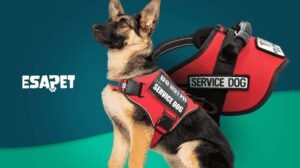What is a Service Dog? Learn Legal Rights and How to Get One

Service dogs are specially trained dogs that assist people with disabilities. Depending on their training, different types of service dogs exist. Guide dogs help blind people navigate obstacles, and hearing dogs alert people with hearing issues to sounds like alarms.
Service dogs are considered working animals under the Americans with Disabilities Act (ADA). This means they have public access rights under federal law. These animals also have air travel and housing accommodations rights, guaranteed when owners have a PSD Letter.
This article will discuss service dogs, their types, and their legal rights. We’ll also cover registration and training requirements for service animals.
What is a Service Dog?
- Sensory disabilities like blindness and deafness
- Physical disabilities
- Developmental disabilities like ADHD
- Mental illnesses like depression and PTSD
Service dogs are specially trained to perform specific tasks related to their handlers’ disabilities. These disabilities can include sensory disabilities, physical disabilities, developmental disabilities, and mental illnesses.
Depending on their training, service dogs can perform different tasks. For example, a guide dog helps blind people walk safely. People with physical disabilities can benefit from mobility assistance dogs. These dogs can perform tasks like opening doors and retrieving items.
Service animals have certain legal protections. Unlike therapy dogs and emotional support animals (ESAs), the ADA considers service animals as working dogs. Therefore, they have public access rights under the ADA.
Under the Fair Housing Act (FHA) they are also protected from housing discrimination and discrimination in air travel. If the dog’s mere presence comforts the owner, it’s not considered a service animal under the ADA.
Service Animal Legal Protections Under the ADA
According to the ADA, service dogs are working dogs that are specifically trained to perform tasks for individuals with disabilities. The ADA grants them legal protections in terms of public access.
The ADA prohibits discrimination against individuals with disabilities. This includes discrimination that would prevent access due to a service dog. Public access rights mean service dogs can go with their handlers in public spaces.
These include hotels, restaurants, hospitals, retail stores, government buildings, and public transportation. They are even allowed to go to places with a “no pets” policy.
Types of Service Dogs
Service dogs are trained to perform tasks that enhance the independence and safety of people with disabilities. Different types of service dogs exist depending on the tasks they perform. Here are the most common types of service dogs:
Guide Dogs
These dogs assist people with low vision, blindness, or significant visual impairments. They help their handlers navigate obstacles and cross streets and roads safely.
Hearing Dogs
These dogs are trained to assist individuals with hearing disabilities. They alert their handlers to sounds like alarms and doorbells.
Mobility Assistance Dogs
People with physical disabilities can benefit from mobility assistance service dogs. These dogs can perform tasks like opening and closing doors and drawers, retrieving dropped items, turning lights on and off, pushing elevator buttons, and more. A study found that people with mobility service dogs also experienced additional psychosocial benefits, such as companionship and increased social interaction.
Seizure Alert and Diabetic Alert Dogs
Seizure alert dogs are trained to perform tasks for people with seizure disorder. For example, they can alert family members when an individual is having a seizure or lie next to them. Diabetic alert dogs can sense blood sugar levels and alert their owners to drops in blood sugar.
Psychiatric Service Dogs (PSDs)
PSDs help people with mental health conditions. These include conditions like post traumatic stress disorder (PTSD), depression, and anxiety. Several studies have found that PSDs can prove to be an effective additional treatment for military veterans with PTSD.
PSDs can perform different tasks. For example, they can calm their handlers during an anxiety attack, remind the owner to take medication, etc.
Allergy Detection Dogs
These dogs can trace specific allergens in the environment and food. They can be trained to detect allergens like gluten or peanuts that can cause severe allergic reactions.
Best Service Dog Breeds
Any dog can be a service dog, given that it can be trained to perform a task directly related to a person’s disability. It should have the right temperament, physical ability, and aptitude for the required tasks.
However, certain dog breeds are better suited to be service animals. Here’s a list of common breeds that make for the best service dogs:
 | Labrador RetrieverLabrador Retrievers are a highly popular choice when it comes to service dogs. They are known for their intellectual capabilities and calm temperament. They are also easy to train. Labrador Retrievers can be trained for different service roles. They are commonly trained as guide dogs, mobility assistance dogs, and PSDs. |
 | Golden RetrieversGolden Retrievers also make for excellent service dogs thanks to their patience and gentle behavior. They are also quick learners and have a strong desire to connect with people. They’re well-suited for guide dog roles and mobility assistance. They can also perform medical alert tasks efficiently. These include detecting seizures or low blood sugar levels. |
 | Bernese Mountain DogsWith their calmness, loyalty, and intelligence, Bernese Mountain Dogs are a perfect choice for service dogs. These large, strong, and steady dogs are a good fit to be trained as mobility assistance dogs. They can perform tasks like pulling wheelchairs, retrieving objects, and offering balance support. |
 | PoodlesPoodles are known for their calm demeanor and intelligence. They are also hypoallergenic, which makes them a good choice for people with allergies. Their trainability and intelligence make them good at various service dog tasks. For example, Standard Poodles can serve as guide dogs and mobility assistance dogs. They also make for good diabetic alert dogs. |
 | German ShepherdsGerman Shepherds have been serving as service dogs for a long time. They are highly trainable, highly intelligent, loyal, and protective. They excel as guide dogs. German Shepherds are also often chosen for psychiatric service roles, such as PTSD support. |
Breeds Best Suited for Specific Tasks
There is no hard and fast rule for which dog breed is best suited for which specific job. However, certain breeds can perform some tasks better than other breeds.
For example, Labrador Retrievers and Bernese Mountain Dogs are great choices for mobility assistance dogs. German Shepherd dogs make good guide dogs and PSDs, and poodles are best suited for individuals with allergies.
Get your Official PSD Letter Consultation from a licensed therapist.
Get PSD Letter NowService Dog Registration Requirements
Various websites sell service animal certification or registration for a fee. They may also provide an ID card and registration number for the dog. A common misconception is that the handler should register his or her service animal to exercise legal rights.
However, it’s important to know that these websites are not affiliated with any government body. Service dogs are not legally required to be registered or certified. The only rule is specialized training to perform tasks to assist their handler with a disability.
Some people still prefer to voluntarily get ID cards, vests, and tags for their service dogs. Service animal registration letters also help them avoid conflicts and misunderstandings in public settings.
Assistance Dogs International (ADI) is a reputable resource if you’re looking to get a service dog. It helps you find a service dog from a non-profit organization. ADI member organizations also provide training for service dogs.
Is Service Dog Registration Legally Required?
No. There are no legal requirements for service dog registration by any government organization. The ADA does not need service dogs to be identified by a vest or tag, certified or registered.
Public establishments, airlines, and landlords cannot ask a service dog owner to show paperwork. They may only ask whether the dog is required because of a disability and what tasks the dog is trained to perform.
However, service dog registration can be useful for identification in some situations. It can help prevent conflicts, interruptions, or unwanted questions in public places, during air travel, or when renting a house. See a Service Dog Registration Letter template.
Service Dog Training Requirements
Training a service dog is a time-consuming process. It involves training the dog to perform tasks related to the handler’s disability. Service dogs are also given public access training. This helps ensure that they behave appropriately in public settings.
Depending on your needs and resources, you can train the service dog yourself or have it trained through a professional training program. You must have sufficient knowledge, time, and patience to train the dog yourself. You can seek guidance from specialized trainers to train your dog.
Professional training may be a better option for certain complex tasks. Professional trainers provide thorough training, and the time it takes to complete the training is often quicker. However, a professional training program can be costly.
Key Skills and Training Timeline for Service Dogs
Service dogs undergo extensive training to learn key skills. These include basic obedience, task-specific skills, and socialization. Teaching these skills ensures service dogs can reliably support their handlers in diverse environments.
It’s important to know that service dog training is an ongoing process. Ongoing reinforcement and practice are essential.
Disabilities That Qualify for a Service Dog
A wide range of disabilities qualify for service dog assistance under the ADA. These include different types of physical impairments, sensory disabilities, and mental health conditions.
Physical and sensory disabilities include mobility, visual, and hearing impairments. Service dogs can provide essential assistance to people with these disabilities.
For example, service dogs can assist individuals with mobility challenges. They can retrieve objects, provide balance, open doors, press elevator buttons, etc.
Mental health conditions like PTSD, depression, anxiety disorders, and autism also qualify for service dogs. These dogs can be trained to interrupt harmful behavior, calm their handlers during an anxiety attack, and more.
Examples of Disabilities Assisted by Service Dogs
Service dogs are essential in enhancing the quality of life for people with disabilities. These dogs assist their handlers by performing tasks that help manage the effects of disabilities. Here are some common disabilities for which these dogs provide invaluable support:
- Mobility impairments, such as arthritis and spinal injuries.
- Blindness
- Severe visual impairments
- Deafness or significant hearing loss
- PTSD
- Autism
- Anxiety disorders
- Seizures
- Diabetes
Where to Get a Service Dog
Numerous non-profit organizations specialize in training service dogs. Individuals can contact these organizations to get a service dog. These organizations can match individuals with a trained dog best suited to their disability.
If you already have a dog, you can train it to perform specific tasks related to your disability. You can also get it trained by a professional trainer. Some individuals may prefer to adopt a dog from a shelter or rescue group. They can then train it to become a service dog.
Costs and Time Commitment for Getting a Service Dog
Getting a service dog involves various costs and time commitments. These can vary depending on the method you choose to obtain the dog. If you get your service dog tried through a professional organization, the cost ranges between $10,000 and $50,000.
The exact cost depends on the dog’s tasks and the training organization involved. However, the organization may put you on a waiting list, and the application process can take several months.
Professional trainers typically charge $150 to $250 per hour. The fees vary depending on the tasks the dog needs to be trained for. Training usually takes 6 to 18 months, depending on the complexity of the tasks.
Service Dog Certification: What You Need to Know
A service dog certificate is a document that certifies that a dog has been successfully trained to perform specific tasks to assist its handler with a disability. It provides visible identification for the dog and the handler. However, a service dog certificate is not legally required.
Private organizations, such as professional dog training, offer service dog certification programs. These programs often include training sessions.
The dog is then assessed to ensure it meets the necessary standards. Once the assessment is complete, the organization issues the certificate.
Service Dog Certificate vs. Registration
A service dog certificate is a document that confirms that the dog has completed training, it may be a Service Dog Letter or a Certificate of Training. It proves the dog has been thoroughly assessed and can perform tasks related to a handler’s disability.
Service dog registration involves placing a dog on a list or database. The database identifies the dog as a service dog, and the dog is often given a unique ID number or tag. However, neither the ADA nor any other law legally requires service dog certification nor registration.
Frequently Asked Questions About Service Dogs
What Makes a Dog a Service Dog?
A dog is considered a service dog if it is specifically trained to perform tasks that assist a person with a disability. These tasks can include retrieving objects, opening doors, helping blind people navigate obstacles, and alerting people with hearing loss issues to sounds.
What Disabilities Qualify for a Service Dog in Texas?
Like in other parts of the US, people with various disabilities qualify for a service dog in Texas under the ADA. These include anxiety disorder, PTSD, depression, mobility impairments, blindness, hearing loss, deafness, and more.
Can You Legally Ask for Proof of Service Dog in California?
Businesses and public entities in California can only ask: Is the service animal required for a disability? What tasks the dog is trained to perform? They cannot ask for a certificate, ID card, or other written document.
Can Any Dog Be Called a Service Dog?
Yes. Any dog trained to perform a specific task related to a person’s disability can be a service dog. However, certain dog breeds make for better service animals. These include Labrador Retriever, Golden Retriever, and Bernese Mountain Dog.
Contact ESA Pet for Assistance
Need help with your service dog? Contact ESA Pet for assistance!
Conclusion on Selecting Dogs as Service Animals
A service dog is a specially trained dog that can perform tasks related to a person’s disability. These can include helping blind people cross streets safely, retrieving items, opening doors, and alerting people with hearing loss to sounds like alarms and doorbells.
You can train your own service dog or have it trained by a professional trainer or organization. Training is the only requirement under the ADA for a dog to be a service animal. There are no legal requirements for a service dog certification, registration, or letter.

Dogs, Emotional Support Animal, Travel
JetBlue Pet Policy: All the Essential In...
Andre Gregatti
Jun 5 2024

Dogs, Emotional Support Animal
How to Get a Psychiatric Service Dog: Ce...
Stephane Bandeira
Dec 3 2025




